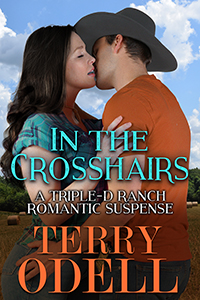R.U.E. Pitfalls
Terry Odell
 A comment by Garry Rodgers to one of Debbie Burke’s posts a while back made me check the archives. I thought for sure I’d written a TKZ post on the subject of R.U.E., but apparently I hadn’t.
A comment by Garry Rodgers to one of Debbie Burke’s posts a while back made me check the archives. I thought for sure I’d written a TKZ post on the subject of R.U.E., but apparently I hadn’t.
When I starting playing around with writing, I belonged to an in person critique group (The Pregnant Pigs, but that’s irrelevant here) and we normally worked with hard copies of our chapters. I was the novice in the group, and my chapters often came back with RUE sprinkled through the pages.
What did that mean? “Resist the Urge to Explain,” they said. “What was I doing wrong?” I asked. And they proceeded to tell me.
As authors, we want to make sure our reader’s “get it,” so we tend to go overboard with information, explaining far too much.
Here’s a simple example: “Mary laughed so hard, she was afraid she’d pulled a stomach muscle. Susie had just told the funniest joke Mary had ever heard.” The second sentence isn’t needed; it’s explaining something the reader would be able to figure out in context.
Another pitfall—telling something, then going on to show it. Let’s say you’re beginning to understand the “show don’t tell” advice everyone gives you, and you put the action on the page. For the sake of example, a simplistic passage might be written as follows:
After Bill cancelled their date, claiming his aunt was sick, Mary was depressed. She took one bite of chocolate cake, then pushed the plate away.
The second sentence shows what the first tells. If you find this in your writing, use your delete key on that first sentence. A better approach:
Mary had been looking forward to her date with Bill for weeks, but he’d cancelled, giving some excuse about a sick aunt. She moved the chocolate cake around the plate with her fork, then pushed it away.
The reader gets the information, and can see that Mary’s depressed without having to be told. You can use the same to show other emotions. Maybe Mary was angry, not depressed, after Bill cancelled. Maybe she throws the whole cake against the wall.
What about this?
Mary’s feet felt like lead. She couldn’t run fast enough to escape the man chasing behind her.
Cut the first sentence. You don’t need both. What about: Mary ran, but her feet refused to move fast enough to escape the man chasing her. Or, Mary’s feet moved as though encased in lead shoes.
Sometimes, we tell the reader too much.
Mary twirled up two strands of spaghetti and waited for the excess sauce to drip onto her plate. Leaning forward, she manipulated the fork into her mouth, then wiped her mouth with her napkin. She was a very careful eater because she hated getting stains on her clothes.
Don’t insult your reader with the last sentence. No need to explain. We can see for ourselves Mary is a meticulous eater.
Another common place writers need to Resist the Urge to Explain is in dialogue. Too often, we tack on tags or beats that tell the reader what the dialogue has already shown. Are you adding adverbs to your dialogue tags?
“I’m sorry,” Tom said apologetically.
Those adverbs are usually signals that you’re telling something the dialogue should be showing. They’re propping up your dialogue, and if it needs propping, it wasn’t strong enough to begin with. All that ‘scaffolding’ merely calls attention to the weak structure beneath.
Will your reader notice these differences? Probably not, but they might not enjoy the read even if they can’t explain why. However, agents and editors are tuned into them, and if you’re submitting, you don’t want to send up any red flags.
Even for experience authors, it’s easy to fall into these traps in early drafts. Some tips:
Check your manuscript for ‘emotion’ words, especially if they’re preceded by “was” or include “felt.” Are you describing your character’s feelings? Don’t tell us how your character feels. Show us.
Check your dialogue tags and beats. Are they consistent with the words being spoken? If so, you don’t need them. If not, your readers will be confused, trying to reconcile dialogue with the action.
Readers are smart. Don’t patronize them by ‘talking down’ to them.
What about you, TKZers? How do you avoid “overselling” in your manuscripts?
Any encounters of RUE from other authors that slog the read?
 Available Now. In the Crosshairs, Book 4 in my Triple-D Romantic Suspense series.
Available Now. In the Crosshairs, Book 4 in my Triple-D Romantic Suspense series.
Changing Your Life Won’t Make Things Easier
There’s more to ranch life than minding cattle. After his stint as an army Ranger, Frank Wembly loves the peaceful life as a cowboy.
Financial advisor Kiera O’Leary sets off to pursue her dream of being a photographer until a car-meets-cow incident forces a shift in plans. Instead, she finds herself in the middle of a mystery, one with potentially deadly consequences.
Terry Odell is an award-winning author of Mystery and Romantic Suspense, although she prefers to think of them all as “Mysteries with Relationships.” Follow her on Facebook and Twitter.

Excellent examples of RUE, Terry.
Thank goodness for critique groups, beta readers, and editors. They spot redundancies that we authors are blind to.
Thanks, Debbie.
I know I couldn’t survive as a writer without extra eyes on the manuscript.
This can really creep into my first drafting, & even on subsequent passes there might be some I overlook. Loved all your examples. This one, though, I wasn’t sure I’d change:
“Mary twirled up two strands of spaghetti and waited for the excess sauce to drip onto her plate. Leaning forward, she manipulated the fork into her mouth, then wiped her mouth with her napkin. She was a very careful eater because she hated getting stains on her clothes.”
In this case, I liked it better WITH the last sentence. The first 2 sentences don’t necessarily imply she’s a meticulous eater–she could be distracted, afraid of being impolite, or some other reason. Maybe that last sentence could be shortened to say something like “She hated getting stains on her clothes.” But somehow, that last little detail reaches out to the OCD in all of us. LOL!
Isn’t playing with words fun? 😎
Thanks, BK. We can never be sure what I reader will like about our sentences, or how much they’ll be able to absorb from what we’re showing. Of course, one hopes the author has shown these character traits throughout the book. If you’re unsure, tossing a little dialogue with another character can help drive your descriptions home. The paragraph could have opened with something like, “Why did I order spaghetti? I hate the drip factor and don’t have anything left in my dry-cleaning budget.”
Thanks for the reminder, Terry. RUE is a great prose sharpener. It came up in several of my past first-page critiques, especially this one, where I counseled the author:
In fact, you should cut the last line of each paragraph. There’s a little guideline called RUE (Resist the Urge to Explain). Each of your last lines is an author explanation of what we’ve just read. Let the action speak for itself.
Your dialogue example reminded me of those old “Tom Swifties.” E.g.,
“Welcome to my tomb,” said Tom cryptically.
“I dropped the toothpaste,” said Tom, crestfallen.
“I can’t believe I ate that whole pineapple,” Tom said dolefully.
“That’s the last time I pet a lion,” Tom said offhandedly.
“My steering wheel won’t turn,” Tom said straightforwardly.
Thanks, Jim.
“I cut myself with the chainsaw,” Joe said offhandedly.
“Resist the urge to explain,” Terry said ruefully.
Thanks for an excellent post and reminder, Terry.
In my first pass of editing I look for boring sentence structure and phrases/words/sentences that need to be removed or changed. And I never cease to be amazed what jumps out to grab me when Scrivener reads the chapter while I listen.
I agree with Debbie, critique groups and beta readers are valuable as a set of fresh eyes.
Thanks for the tips and reminders.
Thanks, Steve. Glad to call attention to some of the “little things” we tend to forget.
Hearing the words adds a new layer of editing. More pathways to the brain.
Nice reminders, Terry. And I’m with Debbie. Kudos to critique partners who keep us on the straight and narrow when we miss the mark.
Thanks for stopping by, Karla. Crit partners are golden. Even if we disagree, they show our words as others might see them so we can make better decisions in the editing process.
Great post, Terry! Keeping RUE in mind is very helpful. I’m also thankful for beta readers and my sharp-eyed copy editor.
At the risk of opening a can of worms, I would say that RUE can vary a bit depending upon the narrative distance from your POV. Cozy mysteries in 3rd person, for example, can be a bit further away from the POV, and thus more “telling.” That said, RUE still very much applies, explaining might just be dialed up a little more than say in a close 3rd person thriller. Urban fantasy, often in 1st, can have a very explaining POV, but that’s personality and attitude (see Jim Butcher’s Harry Dresden), and first is a bit different with RUE. But even there, RUE still applies. There are some 1st person urban fantasies I’ve put down because there was too much explaining.
Happy mid-week! Thanks for another thought-provoking post.
Good points, Dale. One of my crit partners writes science fiction/fantasy, and I do tend to ask him for a little more explaining for some of the tech stuff, which leads to his dilemma of getting into AYKB territory. It’s all about balance, and as you point out, knowing your audience/genre conventions.
Great information, Terry. Like most readers, I like to figure things out for myself without being told (or hit over the head) by the author.
‘ “I’m sorry,” Tom said apologetically.’ That would make me laugh and bump me right out of the story.
“Just my two cents about the subject,” Kay said ruefully.
Thanks, Kay. I don’t mind having things explained once if it’s tech type stuff, but don’t keep repeating it. For characters, I like getting my own take on their personalities. One of mine surprised me with her sense of humor. I’ll let her joke-telling “explain” her personality without pointing out that she likes to joke around.
Excellent examples, Terry. These little buggers sneak into first drafts and need to be killed on sight. 😉
…Mary was depressed. She took one bite of chocolate cake, then pushed the plate away.
IMHO, this would be much improved if it read: “Mary was depressed. She took one bite of chocolate cake, then pushed the plate away briefly, before snatching it back and eating the entire cake.”
Yeah, it WAS chocolate after all. 🙂
When some people are depressed, they’d never push the plate away.
Wonderful post, Terry. It’s been a long time since I saw a Tom Swifty. But your point is excellent. On the other hand, now I have to go over everything I’ve ever written and remove the redundancies (he said repeatedly).
Thank you, Steven.
“We don’t have a homerun hitter,” Tom said ruthlessly.
“I keep shocking myself,” said Tom, revolted.
“I can’t get down from the mountain!” Tom alleged.
Terry, we must have had the same crit group. And I almost spit my coffee when I read some of the comments. Thanks to you all for a great way to start my day,” she said gratefully.
Thanks, Patricia. You have a great day.